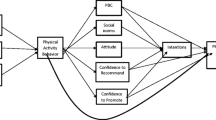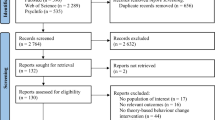Abstract
Purpose
The purpose of this qualitative study was to use semi-structured interviews and thematic analysis to elicit key influencing factors (i.e., behavioral, normative, and control beliefs) related to physical activity and exercise in colorectal cancer survivors.
Methods
Colorectal cancer survivors (N = 17) were recruited from exercise programs designed for colorectal cancer survivors at the Yonsei Cancer Center, Seoul, South Korea. A purposive sampling method was used. Interview questions were informed by the theory of planned behavior (TPB). Semi-structured face-to-face interviews were conducted, and open-ended questions addressed the research question. Interviews were transcribed verbatim and analyzed using thematic analysis.
Results
Participants were on average 2.2 years post-treatment. The mean age of the sample was 55.9 years. Key behavioral, normative, and control beliefs emerged in the data. For behavioral beliefs, colorectal cancer survivors believed that exercise would result in physical and psychological improvements, and improve their bowel problems. For normative beliefs, most colorectal cancer survivors wanted their oncologists’ approval for participation of exercise. Family members, more specifically the spouse, were also influencing factors for colorectal cancer survivors adopting physical activity. The most frequently mentioned control belief was that supervised exercise with an exercise specialist made exercise participation easier.
Conclusions and implications
Beliefs identified in this study can inform TPB-based physical activity interventions tailored for colorectal cancer survivors. While information alone may not lead to behavior change, integrating these beliefs with other influential factors can potentially enhance intervention efficacy and promote physical activity in this population.

Similar content being viewed by others
Data availability
Data will be made available on request.
References
Friedenreich CM, Stone CR, Cheung WY, Hayes SC (2020) Physical activity and mortality in cancer survivors: a systematic review and meta-analysis. JNCI Cancer Spectr 4(1):350–358
Je Y, Jeon JY, Giovannucci EL, Meyerhardt JA (2013) Association between physical activity and mortality in colorectal cancer: a meta-analysis of prospective cohort studies. Int J Cancer 133(8):1905–1913
Kim JY, Lee MK, Lee DH, Kang DW, Min JH, Lee JW et al (2019) Effects of a 12-week home-based exercise program on quality of life, psychological health, and the level of physical activity in colorectal cancer survivors: a randomized controlled trial. Support Care Cancer 27(8):2933–2940
Jung Y, Chung J, Son H (2021) Physical activity interventions for colorectal cancer survivors: a systematic review and meta-analysis of randomized controlled trials. Cancer Nurs 44(6):E414–E428
Machado P, Morgado M, Raposo J, Mendes M, Silva CG, Morais N (2022) Effectiveness of exercise training on cancer-related fatigue in colorectal cancer survivors: a systematic review and meta-analysis of randomized controlled trials. Support Care Cancer 30(7):5601–5613
Chung JY, Lee DH, Park JH, Lee MK, Kang DW, Min J et al (2013) Patterns of physical activity participation across the cancer trajectory in colorectal cancer survivors. Support Care Cancer 21(6):1605–1612
Blanchard CM, Courneya KS, Stein K, American Cancer Society’s SCS-II (2008) Cancer survivors’ adherence to lifestyle behavior recommendations and associations with health-related quality of life: results from the American Cancer Society’s SCS-II. J Clin Oncol 26(13):2198–204
Campbell KL, Winters-Stone KM, Wiskemann J, May AM, Schwartz AL, Courneya KS et al (2019) Exercise guidelines for cancer survivors: consensus statement from international multidisciplinary roundtable. Med Sci Sports Exerc 51(11):2375–2390
Fisher A, Wardle J, Beeken RJ, Croker H, Williams K, Grimmett C (2016) Perceived barriers and benefits to physical activity in colorectal cancer patients. Support Care Cancer 24(2):903–910
Courneya KS, Friedenreich CM, Quinney HA, Fields ALA, Jones LW, Vallance JKH et al (2005) A longitudinal study of exercise barriers in colorectal cancer survivors participating in a randomized controlled trial. Ann Behav Med 29(2):147–153
Lynch BM, Owen N, Hawkes AL, Aitken JF (2010) Perceived barriers to physical activity for colorectal cancer survivors. Support Care Cancer 18(6):729–734
Kang DW, Chung JY, Lee MK, Lee J, Park JH, Kim DI et al (2014) Exercise barriers in Korean colorectal cancer patients. Asian Pac J Cancer Prev APJCP 15(18):7539–7545
Byeon J, Lee M, Chung J, Yoo S, Jeon J (2019) Exercise participation experiences of colorectal cancer survivors. Asian Oncol Nurs 19(2):98–105
Ajzen I (1991) The theory of planned behavior. Organ Behav Hum Decis Process 50(2):179–211
Courneya KS, Friedenreich CM, Arthur K, Bobick TM (1999) Understanding exercise motivation in colorectal cancer patients: a prospective study using the theory of planned behavior. Rehabil Psychol 44:68–84
Forbes CC, Blanchard CM, Mummery WK, Courneya KS (2015) A comparison of physical activity preferences among breast, prostate, and colorectal cancer survivors in Nova Scotia Canada. J Phys Act Health 12(6):823–833
Speed-Andrews AE, McGowan EL, Rhodes RE, Blanchard CM, Culos-Reed SN, Friedenreich CM et al (2014) Identification and evaluation of the salient physical activity beliefs of colorectal cancer survivors. Cancer Nurs 37(1):14–22
Ajzen I (2023) Behavioral interventions based on the theory of planned behavior. Icek Ajzen: Homepage. https://people.umass.edu/aizen/pdf/tpb.intervention.pdf. Accessed 10 Mar 2023
Fishbein M, von Haeften I, Appleyard J (2001) The role of theory in developing effective interventions: implications from Project SAFER. Psychol Health Med 6(2):223–238
Fishbein M (2001) Project SAFER: using theory to identify critical targets for HIV prevention interventions. Psychol Health Med 6:137–138
Short CE, James EL, Plotnikoff RC (2013) Theory-and evidence-based development and process evaluation of the Move More for Life program: a tailored-print intervention designed to promote physical activity among post-treatment breast cancer survivors. Int J Behav Nutr Phys Act 5(10):124
Vallance JKH, Courneya KS, Plotnikoff RC, Yasui Y, Mackey JR (2007) Randomized controlled trial of the effects of print materials and step pedometers on physical activity and quality of life in breast cancer survivors. J Clin Oncol 25(17):2352–2359
Vallance JK, Friedenreich CM, Lavallee CM, Culos-Reed N, Mackey JR, Walley B et al (2016) Exploring the feasibility of a broad-reach physical activity behavior change intervention for women receiving chemotherapy for breast cancer: a randomized trial. Cancer Epidemiol Biomarkers Prev 25(2):391–398
Vallance JKH, Courneya KS, Plotnikoff RC, Mackey JR (2008) Analyzing theoretical mechanisms of physical activity behavior change in breast cancer survivors: results from the activity promotion (ACTION) trial. Ann Behav Med Publ Soc Behav Med 35(2):150–158
Braun V, Clarke V (2006) Using thematic analysis in psychology. Qual Res Psychol 3(2):77–101
Black J (1976) Methods and issues in social research. John Wiley & Sons
Johnston J, Pennypacker H, Green G (2019) Strategies and Tactics of Behavioral Research and Practice, 4th edn. Routledge
Hardcastle SJ, Cohen PA (2017) Effective physical activity promotion to survivors of cancer is likely to be home based and to require oncologist participation. J Clin Oncol 35(32):3635–3637
Jones LW, Courneya KS, Fairey AS, Mackey JR (2004) Effects of an oncologist’s recommendation to exercise on self-reported exercise behavior in newly diagnosed breast cancer survivors: a single-blind, randomized controlled trial. Ann Behav Med 28(2):105–113
Kirkham AA, Van Patten CL, Gelmon KA, McKenzie DC, Bonsignore A, Bland KA et al (2018) Effectiveness of oncologist-referred exercise and healthy eating programming as a part of supportive adjuvant care for early breast cancer. Oncologist 23(1):105–115
Park JH, Lee J, Oh M, Park H, Chae J, Kim DI et al (2015) The effect of oncologists’ exercise recommendations on the level of exercise and quality of life in survivors of breast and colorectal cancer: a randomized controlled trial. Cancer 121(16):2740–2748
Newton RU, Taaffe DR, Chambers SK, Spry N, Galvão DA (2018) Effective exercise interventions for patients and survivors of cancer should be supervised, targeted, and prescribed with referrals from oncologists and general physicians. J Clin Oncol Off J Am Soc Clin Oncol 36(9):927–928
Anderson AS, Caswell S, Wells M, Steele RJC, Macaskill S (2010) “It makes you feel so full of life” LiveWell, a feasibility study of a personalised lifestyle programme for colorectal cancer survivors. Support Care Cancer 18(4):409–415
Stevinson C, Fox KR (2006) Feasibility of an exercise rehabilitation programme for cancer patients. Eur J Cancer Care (Engl) 15(4):386–396
Spence RR, Heesch KC, Brown WJ (2011) Colorectal cancer survivors’ exercise experiences and preferences: qualitative findings from an exercise rehabilitation programme immediately after chemotherapy. Eur J Cancer Care (Engl) 20(2):257–266
Korstjens I, Mesters I, Gijsen B, van den Borne B (2008) Cancer patients’ view on rehabilitation and quality of life: a programme audit. Eur J Cancer Care (Engl) 17(3):290–297
Park JH, Oh M, Yoon YJ, Lee CW, Jones LW, Kim SI et al (2015) Characteristics of attitude and recommendation of oncologists toward exercise in South Korea: a cross sectional survey study. BMC Cancer 10(15):249
Funding
This research was supported by the National Research Foundation of Korea (NRF) the Korea government (No. NRF2013R1A1A2005986), National R&D Programme for Cancer Control, Republic of Korea (HA21C0067000021), and the Yonsei Signature Research Cluster Project (2021–22-0009).
Author information
Authors and Affiliations
Contributions
J.Y.B. J.J., and S.H.J. conceptualized the study. J.Y.B, M.K.L., D.H.P., and N.K.K. recruited participants. J.Y.B. and D.H.P. conducted data collection. J.Y.B. and S.J.Y. analyzed the data. J.Y.B., J.J., and J.V. wrote the manuscript. All authors reviewed the manuscript and approved the final manuscript.
Corresponding author
Ethics declarations
Ethical approval
This study was approved by the Institutional Review Board of Severance Hospital (IRB No. 4–2018-0841).
Competing interests
The authors declare no competing interests.
Additional information
Publisher's Note
Springer Nature remains neutral with regard to jurisdictional claims in published maps and institutional affiliations.
Rights and permissions
Springer Nature or its licensor (e.g. a society or other partner) holds exclusive rights to this article under a publishing agreement with the author(s) or other rightsholder(s); author self-archiving of the accepted manuscript version of this article is solely governed by the terms of such publishing agreement and applicable law.
About this article
Cite this article
Byeon, J.Y., Lee, M.K., Park, DH. et al. A qualitative exploration of exercise motivation among colorectal cancer survivors: an application of the theory of planned behavior. Support Care Cancer 32, 176 (2024). https://doi.org/10.1007/s00520-024-08362-0
Received:
Accepted:
Published:
DOI: https://doi.org/10.1007/s00520-024-08362-0




